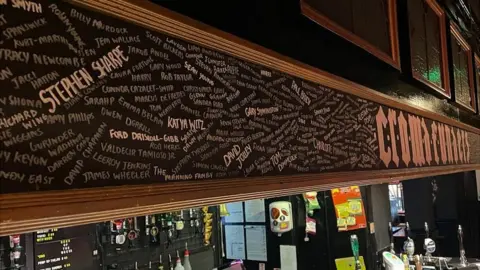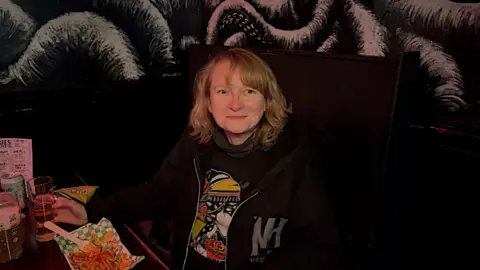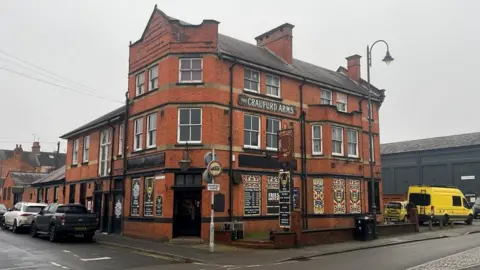Independent Venue Week: 'If you don't use it, you'll lose it'
 BBC
BBCIndependent Venue Week is back for its 10th year, celebrating the grassroots music establishments that have, in recent times, faced unprecedented challenges. Those that survived the Covid lockdowns and reduced capacity measures now face another threat - the cost of living crisis. With pubs and small venues across the UK battling to stay open, could rising costs signal a final encore? BBC News spent the night at a renowned venue in Milton Keynes that is fighting hard to keep the punters rolling in.
The thrill of going to a live gig, with roaring crowds, thundering bass and sweat dripping off the ceilings, has perhaps never been at greater risk.
But despite it being a bitterly cold Sunday night in January, The Craufurd Arms is packed. The headliner - Los Angeles four-piece Dirty Honey - more than justify their booking, selling out this 270-capacity venue, with people travelling across the country to see them.
The pub and venue, in various guises, has been part of Wolverton's community for more than 100 years. But not so long ago, this place filled with music lovers was as muted as an unplugged guitar amp.
Like others across the UK, it was forced to close its doors during the Covid-19 outbreak. Staff were furloughed and its future was hanging in the balance.
Thankfully, a reduced rent was agreed with the landlord and an Arts Council England grant helped it keep its head above water.
The venue took to selling branded merchandise and offered its well-stocked alcohol fridges to locals as a home delivery service to bring in some cash.
Above the bar now proudly displays the names of about 1,000 fans who crowdfunded £30,000 to keep the venue alive.

"The pandemic was tough - worrying about the staff, worrying about what was going to happen. But we managed," says Max Harvey, who has run the Craufurd Arms with business partner Jason Hall for the past 10 years.
He explains it feels "quite overwhelming" to have had such passionate support, but warns the road ahead is no easier.
"Now the biggest threat is rising costs. Energy bills are just insane," says Max.
"Our electricity has quadrupled from £16,000 a year to £72,000 a year - that's not including gas and water which have both doubled.
"These are the biggest increases in overheads we have ever seen, which is a real threat to the viability of the business."

Max says it has forced yet more need to adapt.
He has decided to shut the venue on Mondays and Tuesdays, but is opening it up to more of the community - including for theatre groups and video shoots - to bring in some income.
There is little say on the ticket prices they can charge, with many touring acts deciding their own, so drinks prices - a main income earner - have had to rise to a level where people are still willing to pay, but which also cover the rising costs from suppliers.
'How do we make our money?'
"On a sold out show we'd be taking maybe six or seven grand on a weekend [over the bar]. Bigger ones you can take up to eleven. But we're dropping down to about four and a half," says Max.
He states that gig-goers are not coming as often as they once did and when they do, they also spend less money.
"How do we make our money? That is the question," he says with a nervous laugh.
"We just have to keep on punching. Get the gigs in, try and get the punters in. Be creative - try and do new things. We're opening up the space to creatives - anyone who wants to use the space, really, because it's a great space."
In September, the Music Venue Trust warned energy price rises presented an "existential challenge" to venues across the UK and it has been urging the government to find a solution.
One of tonight's attendees, Trina Yates from Cambridge, says travelling to a gig 50-miles away is still worth the expense to her.

"There is an issue with some of the bigger venues, where tickets can be several hundred pounds, which is really unaffordable for many, many people. Tonight we paid £12.50 and we are getting two amazing bands," she says.
Antonella Sexton, 26, who lives locally, agrees. "It's affordable. I can't afford, you know, to spend £60-70 on a big gig. Now £12.50 - that's bearable, that's two meal deals."

The Craufurd Arms is taking part in Independent Venue Week, running from 30 January to 5 February, which gives it an excuse to offer a week-long programme of events, costing about £10 a ticket. Amsterdam's Pip Blom start the proceedings.
It is taking place in more than 300 UK venues and is a "celebration of independent music and arts venues and the people that own, run and work in them", say organisers.
Max says: "Being a part of Independent Venue Week is great and it gives homage to all the small venues across the country doing great things for their communities, and putting on great shows and art.

"We love it. It's just great awareness. We do seven gigs, but a lot of places do a lot of art, book readings, loads of cool things, which is great because it gives us ideas."
Offering his advice to people who have not attended a small venue for a while, Max says: "Go to them. Use them. Use the facilities they offer.
"They put on a show. You think, 'I'm a bit tired, I don't want to go to that,' you're going to lose the venue.
"If you don't use it, you'll lose it."
BBC Radio 6 Music presenter, Steve Lamacq, who is taking his tour bus around the UK for a series of special shows, says: "Independent Venue Week has always played a vital role in helping grassroots venues at a financially perilous time of year. But it's even more essential now, as venues try and bounce back from the Covid lockdowns and cope with the pressures of the current cost of living situation.
"It's also a great time to get out and see some new and emerging artists before they hit the summer festival stages."
A Department for Digital, Culture, Media and Sport spokesman says: "We know this is a difficult time for music venues and we remain firmly on their side.
"The government has delivered an £18bn package of support for organisations through the Energy Bill Relief Scheme, which includes arts venues and businesses, through the winter.
"The scheme will continue to provide valuable assistance to organisations until the end of March before the new Energy Bills Discount Scheme comes into effect to provide additional assistance for the following year."

Find BBC News: East of England on Facebook, Instagram and Twitter. If you have a story suggestion email [email protected]
